Lets Write a Compiler!
Our goal is to write a compiler which is a function:
compiler :: SourceProgram -> TargetProgramIn 131 TargetProgram is going to be a binary executable.
Lets write our first Compilers
SourceProgram will be a sequence of four tiny “languages”
- Numbers
- e.g.
7,12,42…
- Numbers + Increment
- e.g.
add1(7),add1(add1(12)), …
- Numbers + Increment + Decrement
- e.g.
add1(7),add1(add1(12)),sub1(add1(42))
- Numbers + Increment + Decrement + Local Variables
- e.g.
let x = add1(7), y = add1(x) in add1(y)
Recall: What does a Compiler look like?
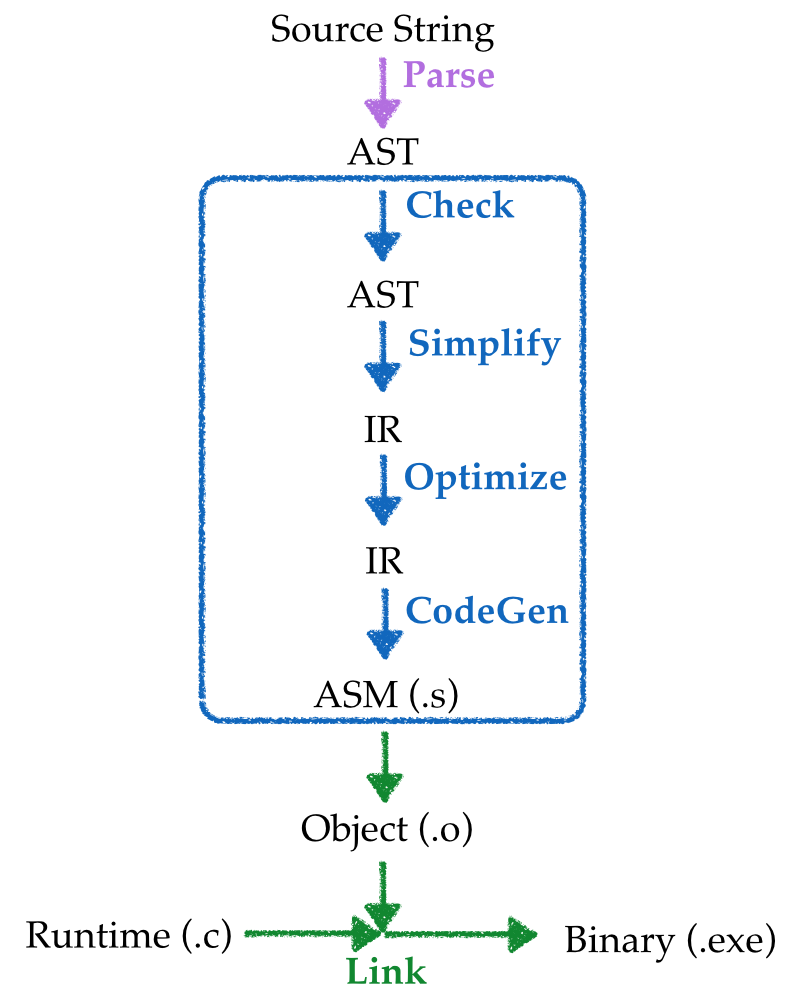
An input source program is converted to an executable binary in many stages:
- Parsed into a data structure called an Abstract Syntax Tree
- Checked to make sure code is well-formed (and well-typed)
- Simplified into some convenient Intermediate Representation
- Optimized into (equivalent) but faster program
- Generated into assembly
x86 - Linked against a run-time (usually written in C)
Simplified Pipeline
Goal: Compile source into executable that, when run, prints the result of evaluating the source.
Approach: Lets figure out how to write
- A compiler from the input string into assembly,
- A run-time that will let us do the printing.
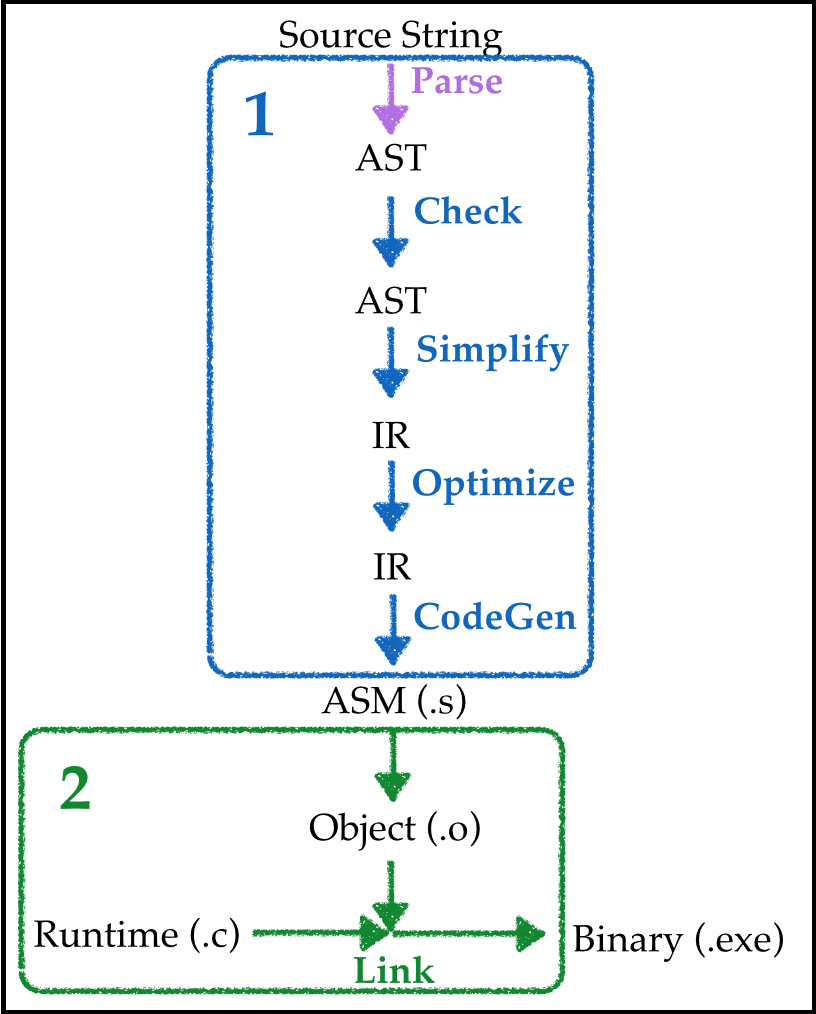
Next, lets see how to do (1) and (2) using our sequence of adder languages.
Adder-1
- Numbers
- e.g.
7,12,42…
The “Run-time”
Lets work backwards and start with the run-time.
Here’s what it looks like as a C program main.c
#include <stdio.h>
extern int our_code() asm("our_code_label");
int main(int argc, char** argv) {
int result = our_code();
printf("%d\n", result);
return 0;
}main just calls our_code and prints its return value
our_code is (to be) implemented in assembly,
Starting at label
our_code_label,With the desired return value stored in register
RAXper, the
Ccalling convention
Test Systems in Isolation
Key idea in (Software) Engineering:
Decouple systems so you can test one component without (even implementing) another.
Lets test our “run-time” without even building the compiler.
Testing the Runtime: A Really Simple Example
Given a SourceProgram
42We want to compile the above into an assembly file forty_two.s that looks like:
section .text
global our_code_label
our_code_label:
mov rax, 42
retFor now, lets just
- write that file by hand, and test to ensure
- object-generation and then
- linking works
(On MacOS)
$ nasm -f macho64 -o forty_two.o forty_two.s
$ clang -g -m64 -o forty_two.run c-bits/main.c forty_two.o(On Linux)
$ nasm -f elf64 -o forty_two.o forty_two.s
$ clang -g -m64 -o forty_two.run c-bits/main.c forty_two.oWe can now run it:
$ forty_two.run
42Hooray!
The “Compiler”
Recall, that compilers were invented to avoid writing assembly by hand
First Step: Types
To go from source to assembly, we must do:

Our first step will be to model the problem domain using types.
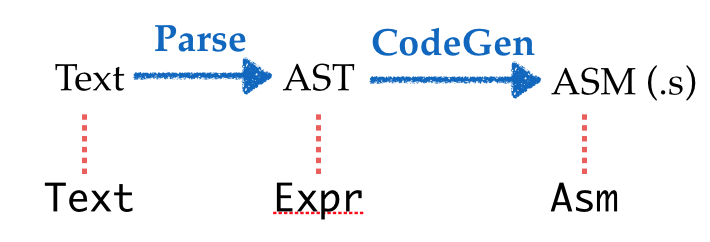
Lets create types that represent each intermediate value:
Textfor the raw input sourceExprfor the ASTAsmfor the output x86 assembly
Defining the Types: Text
Text is raw strings, i.e. sequences of characters
texts :: [Text]
texts =
[ "It was a dark and stormy night..."
, "I wanna hold your hand..."
, "12"
]
Defining the Types: Expr
We convert the Text into a tree-structure defined by the datatype
data Expr = Number IntNote: As we add features to our language, we will keep adding cases to Expr.
Defining the Types: Asm
Lets also do this gradually as the x86 instruction set is HUGE!
Recall, we need to represent
section .text
global our_code_label
our_code_label:
mov rax, 42
retAn Asm program is a list of instructions each of which can:
- Create a
Label, or - Move a
Arginto aRegister Returnback to the run-time.
type Asm = [Instruction]
data Instruction
= ILabel Text
| IMov Arg Arg
| IRetWhere we have
data Register
= RAX
data Arg
= Const Int -- a fixed number
| Reg Register -- a register
Second Step: Transforms
Ok, now we just need to write the functions:
parse :: Text -> Expr -- 1. Transform source-string into AST
compile :: Expr -> Asm -- 2. Transform AST into assembly
asm :: Asm -> Text -- 3. Transform assembly into output-stringPretty straightforward:
parse :: Text -> Expr
parse = parseWith expr
where
expr = integer
compile :: Expr -> Asm
compile (Number n) =
[ IMov (Reg RAX) (Const n)
, IRet
]
asm :: Asm -> Text
asm is = L.intercalate "\n" [instr i | i <- is]Where instr is a Text representation of each Instruction
instr :: Instruction -> Text
instr (IMov a1 a2) = printf "mov %s, %s" (arg a1) (arg a2)
arg :: Arg -> Text
arg (Const n) = printf "%d" n
arg (Reg r) = reg r
reg :: Register -> Text
reg RAX = "rax"
Brief digression: Type-Classes
Note that above we have four separate functions that crunch different types to the Text representation of x86 assembly:
asm :: Asm -> Text
instr :: Instruction -> Text
arg :: Arg -> Text
reg :: Register -> TextRemembering names is hard.
We can write an overloaded function, and let the compiler figure out the correct implementation from the type, using Type-Classes.
The following defines an interface for all those types a that can be converted to x86 assembly:
class ToX86 a where
asm :: a -> TextNow, to overload, we say that each of the types Asm, Instruction, Arg and Register implements or has an instance of ToX86
instance ToX86 Asm where
asm is = L.intercalate "\n" [asm i | i <- is]
instance ToX86 Instruction where
asm (IMov a1 a2) = printf "mov %s, %s" (asm a1) (asm a2)
instance ToX86 Arg where
asm (Const n) = printf "%d" n
asm (Reg r) = asm r
instance ToX86 Register where
asm RAX = "rax"Note in each case above, the compiler figures out the correct implementation, from the types…
Adder-2
Well that was easy! Lets beef up the language!
- Numbers + Increment
- e.g.
add1(7),add1(add1(12)), …
Repeat our Recipe
- Build intuition with examples,
- Model problem with types,
- Implement compiler via type-transforming-functions,
- Validate compiler via tests.
1. Examples
First, lets look at some examples.
Example 1
How should we compile?
add1(7)In English
- Move
7into theraxregister - Add
1to the contents ofrax
In ASM
mov rax, 7
add rax, 1Aha, note that add is a new kind of Instruction
Example 2
How should we compile
add1(add1(12))In English
- Move
12into theraxregister - Add
1to the contents ofrax - Add
1to the contents ofrax
In ASM
mov rax, 12
add rax, 1
add rax, 1
Compositional Code Generation
Note correspondence between sub-expressions of source and assembly
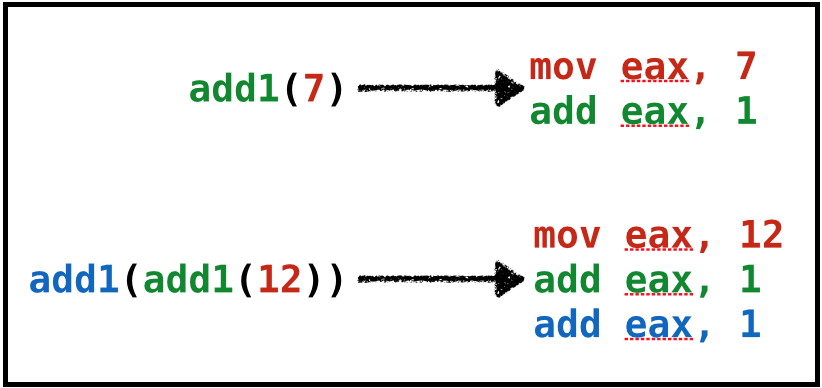
We will write compiler in compositional manner
- Generating
Asmfor each sub-expression (AST subtree) independently, - Generating
Asmfor super-expression, assuming the value of sub-expression is inRAX
2. Types
Next, lets extend the types to incorporate new language features
Extend Type for Source and Assembly
Source Expressions
data Expr = ...
| Add1 ExprAssembly Instructions
data Instruction
= ...
| IAdd Arg Arg
Example-1 Revisited
src1 = "add1(7)"
exp1 = Add1 (Number 7)
asm1 = [ IMov (Reg RAX) (Const 7)
, IAdd (Reg RAX) (Const 1)
]
Example-2 Revisited
src2 = "add1(add1(12))"
exp2 = Add1 (Add1 (Number 12))
asm2 = [ IMov (Reg RAX) (Const 12)
, IAdd (Reg RAX) (Const 1)
, IAdd (Reg RAX) (Const 1)
]
3. Transforms
Now lets go back and suitably extend the transforms:
parse :: Text -> Expr -- 1. Transform source-string into AST
compile :: Expr -> Asm -- 2. Transform AST into assembly
asm :: Asm -> Text -- 3. Transform assembly into output-stringLets do the easy bits first, namely parse and asm
Parse
parse :: Text -> Expr
parse = parseWith expr
expr :: Parser Expr
expr = try primExpr
<|> integer
primExpr :: Parser Expr
primExpr = Add1 <$> rWord "add1" *> parens expr
Asm
To update asm just need to handle case for IAdd
instance ToX86 Instruction where
asm (IMov a1 a2) = printf "mov %s, %s" (asm a1) (asm a2)
asm (IAdd a1 a2) = printf "add %s, %s" (asm a1) (asm a2)Note
- GHC will tell you exactly which functions need to be extended (Types, FTW!)
- We will not discuss
parseandasmany more…
Compile
Finally, the key step is
compile :: Expr -> Asm
compile (Number n)
= [ IMov (Reg RAX) (Const n)
]
compile (Add1 e)
= compile e -- RAX holds value of result of `e` ...
++ [ IAdd (Reg RAX) (Const 1) ] -- ... so just increment it.
Examples Revisited
Lets check that compile behaves as desired:
>>> (compile (Number 12)
[ IMov (Reg RAX) (Const 12) ]
>>> compile (Add1 (Number 12))
[ IMov (Reg RAX) (Const 12)
, IAdd (Reg RAX) (Const 1)
]
>>> compile (Add1 (Add1 (Number 12)))
[ IMov (Reg RAX) (Const 12)
, IAdd (Reg RAX) (Const 1)
, IAdd (Reg RAX) (Const 1)
]
Adder-3
You do it!
- Numbers + Increment + Double
- e.g.
add1(7),twice(add1(12)),twice(twice(add1(42)))
Adder-4
- Numbers + Increment + Decrement + Local Variables
- e.g.
let x = add1(7), y = add1(x) in add1(y)
Can you think why local variables make things more interesting?
Repeat our Recipe
- Build intuition with examples,
- Model problem with types,
- Implement compiler via type-transforming-functions,
- Validate compiler via tests.
Step 1: Examples
Lets look at some examples
Example: let1
let x = 10
in
xNeed to store 1 variable – x
Example: let2
let x = 10 -- x = 10
, y = add1(x) -- y = 11
, z = add1(y) -- z = 12
in
add1(z) -- 13Need to store 3 variables– x, y, z
Example: let3
let a = 10
, c = let b = add1(a)
in
add1(b)
in
add1(c)Need to store 3 variables – a, b, c – but at most 2 at a time
- First
a, b, thena, c - Don’t need
bandcsimultaneously
Problem: Registers are Not Enough
A single register rax is useless:
- May need 2 or 3 or 4 or 5 … values.
There is only a fixed number (say, N) of registers
- And our programs may need to store more than
Nvalues, so
Need to dig for more storage space!
Memory: Code, Globals, Heap and Stack
Here’s what the memory – i.e. storage – looks like:
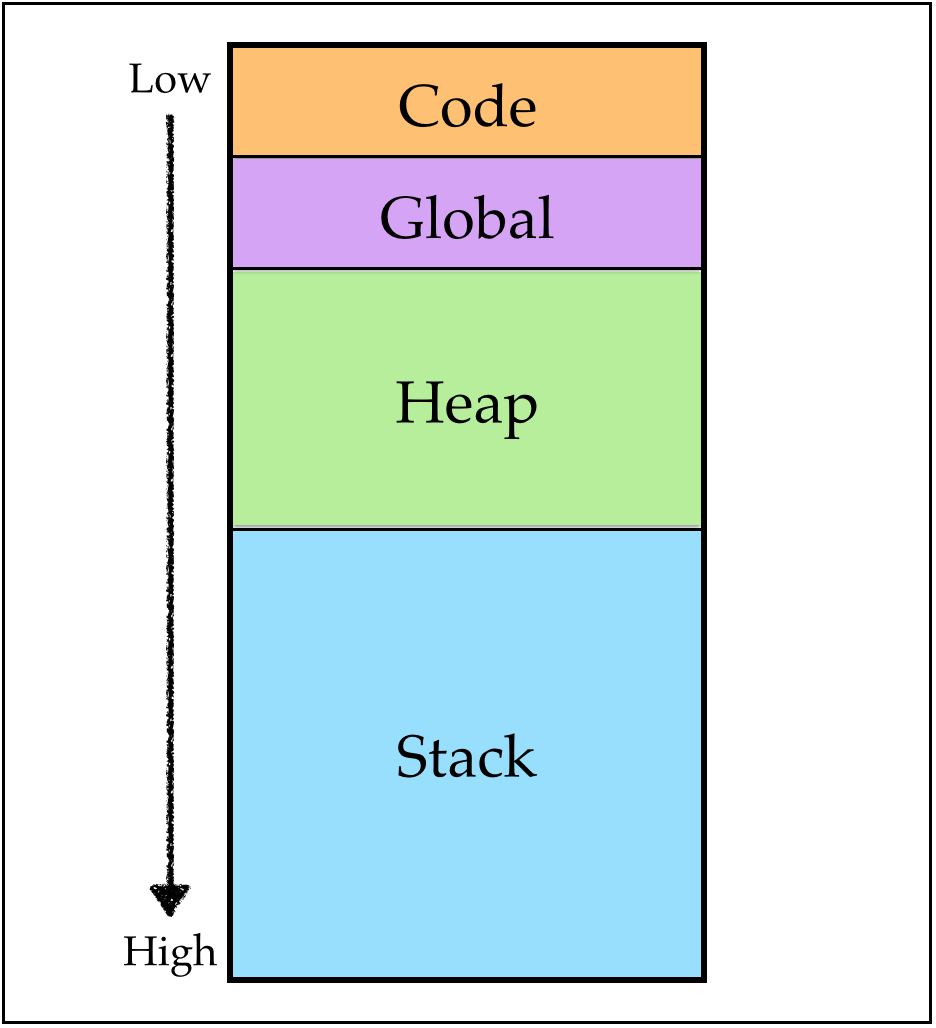
Focusing on “The Stack”
Lets zoom into the stack region, which when we start looks like this:
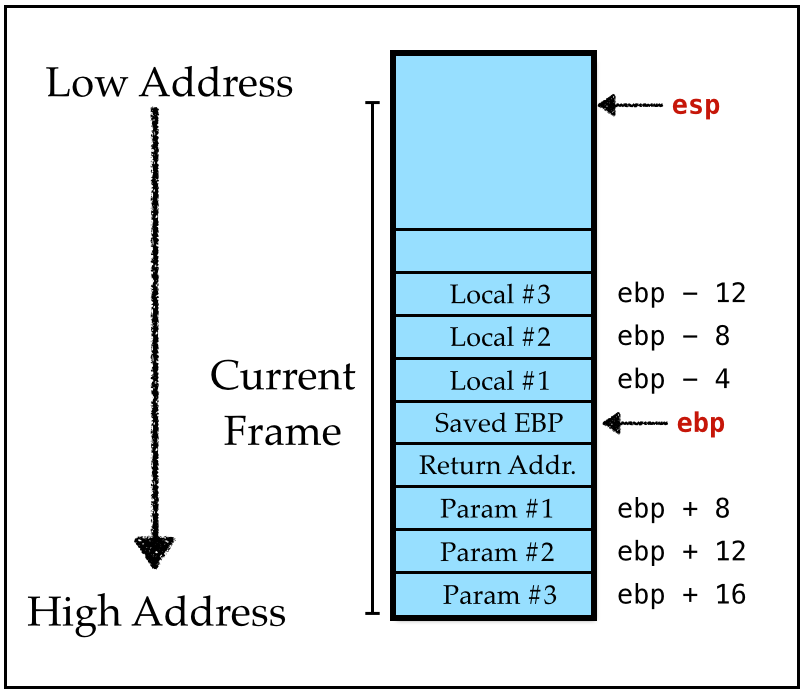
The stack grows downward (i.e. to smaller addresses)
We have lots of 8-byte slots on the stack at offsets from the “stack pointer” at addresses:
[RBP - 8 * 1],[RBP - 8 * 2],[RBP - 8 * 3]…,
Note: On 32-bit machines
- We’d use the
raxregister (vsraxin 64-bit) - The “base” is the
ebpregister (vsrbpin 64-bit) - Each slot is
4-bytes (vs8in 64-bit)
How to compute mapping from variables to slots ?
The i-th stack-variable lives at address [RBP - 8 * i]
Required A mapping
- From source variables (
x,y,z…) - To stack positions (
1,2,3…)
Solution The structure of the lets is stack-like too…
- Maintain an
Envthat mapsId |-> StackPosition
let x = e1 in e2 adds x |-> i to Env
- where
iis ``current’’ size of stack.
Let-bindings and Stacks: Example-1
-- []
let x = 1
in -- [ x |-> 1 ]
x
Let-bindings and Stacks: Example-2
-- []
let x = 1
-- [x |-> 1]
, y = add1(x)
-- [y |-> 2, x |-> 1]
, z = add1(y)
in -- [z |- 3, y |-> 2, x |-> 1]
add1(z)
QUIZ
At what position on the stack do we store variable c ?
let a = 1
, c =
let b = add1(a)
in add1(b)
in
add1(c)A. 1
B. 2
C. 3
D. 4
E. not on stack!
Strategy
-- ENV(n)
let x = E1
in -- [x |-> n+1, ENV(n)]
E2
-- ENV(n)
Strategy: Variable Definition
At each point, we have env that maps (previously defined) Id to StackPosition
To compile let x = e1 in e2 we
- Compile
e1usingenv(i.e. resulting value will be stored inrax) - Move
raxinto[RBP - 8 * i] - Compile
e2usingenv'
(where env' be env with x |-> i i.e. push x onto env at position i)
Strategy: Variable Use
To compile x given env
- Move
[RBP - 8 * i]intorax
(where env maps x |-> i)
Example: Let-bindings to Asm
Lets see how our strategy works by example:
Example: let1

QUIZ: let2
When we compile
let x = 10
, y = add1(x)
in
add1(y)The assembly looks like
mov rax, 10 ; LHS of let x = 10
mov [RBP - 8*1], rax ; save x on the stack
mov rax, [RBP - 8*1] ; LHS of , y = add1(x)
add rax, 1 ; ""
???
add rax, 1What .asm instructions shall we fill in for ???
mov [RBP - 8 * 1], rax ; A
mov rax, [RBP - 8 * 1]
mov [RBP - 8 * 1], rax ; B
mov [RBP - 8 * 2], rax ; C
mov [RBP - 8 * 2], rax ; D
mov rax, [RBP - 8 * 2]
; E (empty! no instructions)
Example: let3
Lets compile
let a = 10
, c = let b = add1(a)
in
add1(b)
in
add1(c)Lets figure out what the assembly looks like!
mov rax, 10 ; LHS of let a = 10
mov [RBP - 8*1], rax ; save a on the stack
???
Step 2: Types
Now, we’re ready to move to the implementation!
Source Expressions
type Id = Text
data Expr = ...
| Let Id Expr Expr -- `let x = e1 in e2` represented as `Let x e1 e2`
| Var Id -- `x` represented as `Var x`Assembly Instructions
Lets enrich the Instruction to include the register-offset [RBP - 8*i]
data Arg = ...
| RegOffset Reg Int -- `[RBP - 8*i]` modeled as `RegOffset RBP i`
Environments
An Env type to track stack-positions of variables with API
pushvariable ontoEnv(returning its position),lookupa variable’s position inEnv
push :: Id -> Env -> (Int, Env)
push x env = (i, (x, i) : env)
where
i = 1 + length env
lookup :: Id -> Env -> Maybe Int
lookup x ((y, i) : env)
| x == y = Just i
| otherwise = lookup x env
lookup x [] = Nothing
Step 3: Transforms
Almost done: just write code formalizing the above strategy
Code: Variable Use
compileEnv env (Var x) = [ IMov (Reg RAX) (RegOffset RBP i) ]
where
i = fromMaybe err (lookup x env)
err = error (printf "Error: Variable '%s' is unbound" x)
Code: Variable Definition
compileEnv env (Let x e1 e2 l) = compileEnv env e1
++ IMov (RegOffset RBP i) (Reg RAX)
: compileEnv env' e2
where
(i, env') = pushEnv x env
Step 4: Tests
Lets take our adder compiler out for a spin!
Recap: We just wrote our first Compilers
SourceProgram will be a sequence of four tiny “languages”
- Numbers
- e.g.
7,12,42…
- Numbers + Increment
- e.g.
add1(7),add1(add1(12)), …
- Numbers + Increment + Decrement
- e.g.
add1(7),add1(add1(12)),sub1(add1(42))
- Numbers + Increment + Decrement + Local Variables
- e.g.
let x = add1(7), y = add1(x) in add1(y)
Using a Recipe
- Build intuition with examples,
- Model problem with types,
- Implement compiler via type-transforming-functions,
- Validate compiler via tests.
Will iterate on this till we have a pretty kick-ass language.
